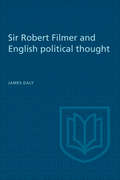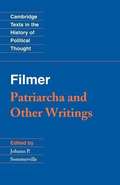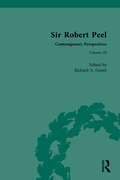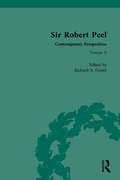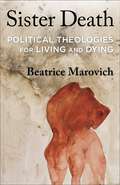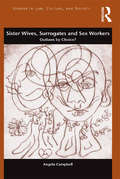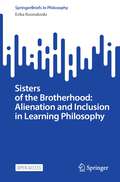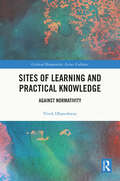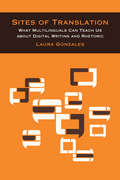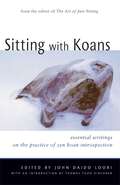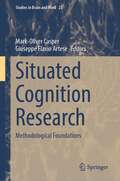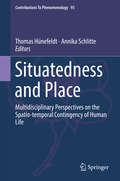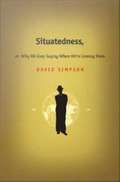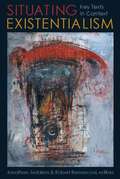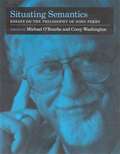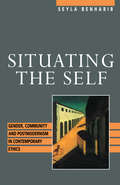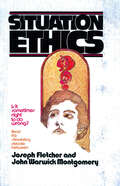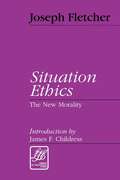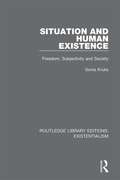- Table View
- List View
Sir John's Echo: The Voice for a Stronger Canada
by John BoykoThe Hill Times: Best Books of 2017 As Sir John A. Macdonald intended, the federal government must be recognized as the nation’s voice. Power. It is the capacity to inspire while encouraging and enabling change, and it matters. When handled in a positive way, power is the key to the state’s ability to strengthen the nation and improve lives. But state power, John Boyko argues forcefully, works best when concentrated on a federal level, as Sir John A. Macdonald and Canada’s other founders intended. Provincial governments are essential, tending to local matters, administering and helping to fund national programs, and sometimes acting as incubators for ideas that grow to become national programs. But in fighting for scraps of power, premiers have often distracted from and occasionally hindered national progress. It is the federal government, as Boyko explains, that has been the primary force in nation building and emergency response, and is the only entity with the authority to speak for all Canadians. Canada has been at its best, and its strength will continue to grow, if we are true to Macdonald’s vision, with the federal government speaking for us in one voice, a voice that will remain Sir John’s echo.
Sir Robert Filmer and English Political Thought
by James DalySir Robert Filmer (1588-1653) was a defender of 'the Natural Power of Kings against the Unnatural Liberty of the People.' His doctrine of omnicompetent sovereignty had little influence on the thought and political debates of his time, for none of his writings was published until the last few years of his life; but it came under scrutiny later in the century, particularly during the exclusion crisis and in the political writings of John Locke. This book is the first comprehensive analysis of his thought, its context, and its place in English political thought as a whole. Daly examines Filmer's publishing career, his relation to contemporary writers and critics, and the chief sources on which he drew. The book thus provides the background for a study of Filmer's theory of sovereignty, its voluntarist concept of law, its rejection of prescription, fundamental law, and non-monarchical forms of government, and its insistence that monarchy be not only absolute, but arbitrary as well. Analysing Filmer's interpretation of Adam's (and all kings') 'fatherly power,' here described as 'legal patriarchalism,' Daly shows it to be very different from most contemporary thought. In comparing Filmer's thought with that of other royalists and the positions taken by his critics, notably Edward Gee, James Tyrrell, Algernon Sidney, and of course Locke, he shows it to be strikingly original, almost revolutionary, and frequently distorted by those who dealt with it.
Sir Robert Filmer: Patriarcha and Other Writings
by Robert Filmer Johann P. SommervilleThis volume contains the political writings of Sir Robert Filmer (1588-1653), an acute defender of absolute monarchy and perhaps the most important patriarchal political theorist of the seventeenth century. The recent explosion of interest in women's history and the history of the family has greatly enhanced the audience for Filmer's work, and in this new edition Johann Sommerville provides accurate and accessible texts of his principal writings, accompanied by all the standard series features, including a concise introduction, chronology, guide to further reading and notes on Filmer's own text.
Sir Robert Peel: Contemporary Perspectives
by Richard A. GauntSir Robert Peel (1788-1850) was one of the most significant political figures in nineteenth-century Britain. He was also one of the most controversial. In this new, three-volume edition, Dr Richard Gaunt, an authority on Peel’s life and work, brings together a range of contemporary perspectives considering Peel’s life and achievements. From the first observation of Peel’s precocious talent as an Oxford undergraduate to his burgeoning reputation as a cabinet minister, the volumes draw together sources on Peel’s forty-year political career. The edition pays particular attention to the most controversial aspects of his political life – the granting of Catholic Emancipation in 1829, his ‘founding’ of the Conservative Party during the 1830s and the achievements of his landmark government of 1841-6, culminating in the repeal of the corn laws in 1846. It also considers Peel’s post-1846 career, and the unusual position he occupied in British politics before his untimely death in 1850. Combining perspectives from different parts of the political spectrum, the collection will be of use to a wide range of researchers, with interests in history, politics, religion, economics and political biography.
Sir Robert Peel: Contemporary Perspectives
by Richard A. GauntSir Robert Peel (1788-1850) was one of the most significant political figures in nineteenth-century Britain. He was also one of the most controversial. In this new, three-volume edition, Dr Richard Gaunt, an authority on Peel’s life and work, brings together a range of contemporary perspectives considering Peel’s life and achievements. From the first observation of Peel’s precocious talent as an Oxford undergraduate to his burgeoning reputation as a cabinet minister, the volumes draw together sources on Peel’s forty-year political career. The edition pays particular attention to the most controversial aspects of his political life – the granting of Catholic Emancipation in 1829, his ‘founding’ of the Conservative Party during the 1830s and the achievements of his landmark government of 1841-6, culminating in the repeal of the corn laws in 1846. It also considers Peel’s post-1846 career, and the unusual position he occupied in British politics before his untimely death in 1850. Combining perspectives from different parts of the political spectrum, the collection will be of use to a wide range of researchers, with interests in history, politics, religion, economics and political biography.
Sir Robert Peel: Contemporary Perspectives
by Richard A. GauntSir Robert Peel (1788-1850) was one of the most significant political figures in nineteenth-century Britain. He was also one of the most controversial. In this new, three-volume edition, Dr Richard Gaunt, an authority on Peel’s life and work, brings together a range of contemporary perspectives considering Peel’s life and achievements. From the first observation of Peel’s precocious talent as an Oxford undergraduate to his burgeoning reputation as a cabinet minister, the volumes draw together sources on Peel’s forty-year political career. The edition pays particular attention to the most controversial aspects of his political life – the granting of Catholic Emancipation in 1829, his ‘founding’ of the Conservative Party during the 1830s and the achievements of his landmark government of 1841-6, culminating in the repeal of the corn laws in 1846. It also considers Peel’s post-1846 career, and the unusual position he occupied in British politics before his untimely death in 1850. Combining perspectives from different parts of the political spectrum, the collection will be of use to a wide range of researchers, with interests in history, politics, religion, economics and political biography.
Sister Death: Political Theologies for Living and Dying
by Beatrice MarovichLife and death are commonly seen as representing the starkest of binaries: Death is the ultimate adversary of all that lives. Beatrice Marovich argues that such understandings of mortality have been deeply influenced by a strain of Christian political theology that has left its mark on both religious and secular narratives. Adapting the figure of “Sister Death” from Saint Francis of Assisi, she calls for recognizing that life and death are family.Drawing on a wide range of sources—from Toni Morrison to Jacques Derrida, psychoanalysis to grassroots “death positive” movements—Marovich critiques a racialized political theology that pits life and death against each other in a state of endless war. In a time of extinctions, it is necessary to disrupt this dominant story in order to apprehend death as a collective, multispecies event. Sister Death proposes an alternative view in which life and death are not mortal enemies destined for mutual destruction. Instead, they are engaged in a contested, tense, and sometimes mutually empowering form of connection—a sisterhood.Eloquent and approachable, this book deftly integrates the insights of a number of disciplines to provide a profound reconsideration of the relations between life and death. Sister Death also features a series of original works by the artist Krista Dragomer that stage an ongoing conceptual conversation with the text.
Sister Species: Women, Animals and Social Justice
by Carol J. Adams Lisa A. KemmererSister Species: Women, Animals, and Social Justice addresses interconnections between speciesism, sexism, racism, and homophobia, clarifying why social justice activists in the twenty-first century must challenge intersecting forms of oppression. This anthology presents bold and gripping--sometimes horrifying--personal narratives from fourteen activists who have personally explored links of oppression between humans and animals, including such exploitative enterprises as cockfighting, factory farming, vivisection, and the bushmeat trade. Sister Species asks readers to rethink how they view "others," how they affect animals with their daily choices, and how they might bring change for all who are abused. These essays remind readers that women have always been important to social justice and animal advocacy, and they urge each of us to recognize the links that continue to bind all oppressed individuals. The astonishing honesty of these contributors demonstrates with painful clarity why every woman should be an animal activist and why every animal activist should be a feminist. Contributors are Carol J. Adams, Tara Sophia Bahna-James, Karen Davis, Elizabeth Jane Farians, Hope Ferdowsian, Linda Fisher, Twyla François, Christine Garcia, A. Breeze Harper, Sangamithra Iyer, Pattrice Jones, Lisa Kemmerer, Allison Lance, Ingrid Newkirk, Lauren Ornelas, and Miyun Park.
Sister Wives, Surrogates and Sex Workers: Outlaws by Choice? (Gender in Law, Culture, and Society)
by Angela CampbellDid she choose that?’ Or, more normatively, ’Why would she choose that?’ This book critiques and offers an alternative to these questions, which have traditionally framed law and policy discussions circulating around controversial genderized practices. It examines the simplicity and incompleteness of choice-based rhetoric and of presumptions that women’s conduct is shaped, in an absolute way, either by choice or by coercion. This book develops an analytical framework that aims to discern the meaning and value that women may ascribe to morally ambiguous practices. An analysis of law’s approach to polygamy, surrogacy and sex work, particularly in Canada, the United Kingdom and Australia, provides a basis for evaluating the choice-coercion binary and for contemplating alternate modes for assessing, from a law and policy standpoint, the palatability of social practices that appear pernicious to women. Weaving together interdisciplinary research, an innovative analytical framework for assessing choices ostensibly harmful to women, and a critique of the legal rules governing such choices, this book bears relevance for students, scholars, practicing jurists and policymakers seeking a richer understanding of conduct that moves women to the margins of law and society.
Sisters of the Brotherhood: Alienation and Inclusion in Learning Philosophy (SpringerBriefs in Philosophy)
by Erika RuonakoskiThis open access book explores the gendered reality of learning philosophy at the university level, investigating the ways in which women and minority students become alienated from the social practices of a male-dominated field, and examining pedagogical solutions to this problem. It covers the roles and the interactions of the professor and student in the following ways: (1) the historical situation, (2) the affective, social and bodily situation, and (3) the moral situation. This text analyzes women’s passion for philosophy as a quest for truth, as well as their partial alienation from the social practices of philosophy. It demonstrates that recognition, generosity, and care are central ingredients of good learning and teaching experiences. Providing case studies of experimental courses in philosophy, the book discusses a variety of pedagogical approaches that might increase the inclusiveness of a philosophical education: novel and more gender-balanced ways of interpreting the history of philosophy, problem-based learning as a means of emancipating the student from the traditional master–disciple relationship, body awareness practices as a way of challenging the “disembodying” tendencies of philosophy, and a pluralism of methods to address the needs of different kinds of learners. Thanks to these features, the book is particularly useful for philosophy professors at the university level, but it also provides insights for all readers who feel puzzled about the persistent underrepresentation of women in philosophy.
Sitara: सितारा
by Sanjay Sinhaसितारा पुस्तक संजय सिन्हा द्वारा लिखी गई है, जो जीवन के अनुभवों और रिश्तों की गहराई को सरल कहानियों के माध्यम से व्यक्त करती है। यह पुस्तक उन लघु कथाओं का संग्रह है, जो रोजमर्रा के जीवन में हमारे सामने आने वाले प्रश्नों, दुविधाओं और भावनाओं से जुड़ी हैं। पुस्तक की शीर्षक कहानी "सितारा" एक बच्चे के सपनों और आदर्शों की यात्रा को दर्शाती है। उसे माँ बचपन में ध्रुव तारा, प्रह्लाद और स्वामी विवेकानंद की कहानियाँ सुनाती है, जिससे उसके मन में अच्छा इंसान बनने की महत्वाकांक्षा विकसित होती है। कई कहानियाँ व्यक्तिगत संघर्ष, संबंधों की मिठास और जीवन के उतार-चढ़ाव को उजागर करती हैं। संजय सिन्हा की लेखन शैली सरल होते हुए भी पाठकों के दिलों को छूती है। वे छोटे-छोटे अनुभवों में जीवन के गहरे सत्य खोज निकालते हैं। एक कहानी में वे माँ के इस संदेश को साझा करते हैं कि “चाहे कुछ भी बनो, लेकिन सबसे पहले एक अच्छा इंसान बनो।” यह पुस्तक भावनाओं, रिश्तों और आत्मविश्लेषण के महत्व पर जोर देती है। संजय सिन्हा ने इन कहानियों के जरिए पाठकों को जीवन को सहज और सकारात्मक रूप से देखने का दृष्टिकोण दिया है, जो प्रेरणा और सोच का नया आयाम प्रस्तुत करती है।
Sites of Exposure: Art, Politics, and the Nature of Experience (Studies in Continental Thought)
by John RussonJohn Russon draws from a broad range of art and literature to show how philosophy speaks to the most basic and important questions in our everyday lives. In Sites of Exposure, Russon grapples with how personal experiences such as growing up and confronting death combine with broader issues such as political oppression, economic exploitation, and the destruction of the natural environment to make life meaningful. His is cutting-edge philosophical work, illuminated by original and rigorous thinking that relies on cross-cultural communication and engagement with the richness of human cultural history. These probing interpretations of the nature of phenomenology, the philosophy of art, history, and politics, are appropriate for students and scholars of philosophy at all levels.
Sites of Learning and Practical Knowledge: Against Normativity (Critical Humanities Across Cultures)
by Vivek DhareshwarThis book examines the relationship between cultural difference and practical knowledge and its implications for the study of humanities and the social sciences. It sketches a meta-theory of Western thought to grasp the conceptual distortions that result when a normatively structured theoretical way of understanding the world seeks to displace practical forms of understanding. The book draws on both Western thinkers such as Nietzsche, Marx, Wittgenstein and Foucault and Indian thinkers such as Gandhi, Tagore and Balagangadhara to formulate a practical epistemology that delimits theoretical knowledge by regenerating experiential knowledge that was the hallmark of Indian intellectual traditions and provides the intellectual resources for rejecting normativity. By thus preparing the ground for a radical reconceptualization of the human sciences it seeks to overcome the loss of concepts and the violence generated by the grafting of ill–understood and experience-occluding normative conceptual structures on the fabric of practical life. Finally, the author offers an alternative conceptualization of Indian sociality through the idea of a practitional matrix, which explains both why the West necessarily misunderstood or misdescribed India and how that misdescription enables us to theorize the West. Part of Critical Humanities across Cultures series, this book will be an essential read for scholars and researchers of philosophy, anthropology, sociology, religious studies, post-colonial studies, cultural studies, Indian studies and literature.
Sites of Translation: What Multilinguals Can Teach Us about Digital Writing and Rhetoric (Sweetland Digital Rhetoric Collaborative)
by Laura GonzalesWinner of the 2016 Sweetland Digital Rhetoric Collaborative Book Prize Sites of Translation illustrates the intricate rhetorical work that multilingual communicators engage in as they translate information for their communities. Blending ethnographic and empirical methods from multiple disciplines, Laura Gonzales provides methodological examples of how linguistic diversity can be studied in practice, both in and outside the classroom, and provides insights into the rhetorical labor that is often unacknowledged and made invisible in multilingual communication. Sites of Translation is relevant to researchers and teachers of writing as well as technology designers interested in creating systems, pedagogies, and platforms that will be more accessible and useful to multilingual audiences. Gonzales presents multilingual communication as intellectual labor that should be further valued in both academic and professional spaces, and supported by multilingual technologies and pedagogies that center the expertise of linguistically diverse communicators.
Sitting with Koans
by John Daido Loori Thomas Yuho KirchnerThe Zen tradition has just two main meditative practices: shikantaza, or "just sitting"; and introspection guided by the powerful Zen teaching stories called koans. Following in the tradition of The Art of Just Sitting (endorsed as a "A book we have needed for a long, long time"), this new anthology from John Daido Loori illuminates the subtle practice of koan study from many different points of view. Includes writings by: Robert Aitken William Bodiford Robert Buswell Roko Sherry Chayat Francis Dojun Cook Eihei Dogen Heinrich Dumoulin Hakuin Ekaku Victor Sogen Hori Keizan Jokin Philip Kapleau Chung-fen Ming-Pen Taizan Maezumi Dennis Genpo Merzel Soen Nakagawa Ruth Fuller Sasaki Sokei-an Sasaki Nyogen Senzaki Zenkei Shibayama Eido Shimano Philip Yampolsky Hakuun Yasutani Wayne Yokoyama Katsushiro Yoshizawa
Situated Cognition Research: Methodological Foundations (Studies in Brain and Mind #23)
by Mark-Oliver Casper Giuseppe Flavio ArteseThis volume assembles supporters and critics of situated cognition research to evaluate the intricacies, prerequisites, possibilities, and scope of a 4E methodology. The contributions are divided into three categories. The first category entails papers dealing with a 4E methodology from the perspective of epistemology and philosophy of science. It discusses whether to support explanatory pluralism or explanatory unification and focuses on possible compromises between ecological psychology and enactivism. The second category addresses ontological questions regarding the synchronic and diachronic constitution of cognitive phenomena, the localization of cognitive processes, and the theoretical issue of mutual manipulability. The third category analyzes how the theoretical and practical commitments of 4E approaches lead to empirically supported investigations of different phenomena, such as research on affordances and (chronic) pain. The book renews attention to the possible adverse consequences coming along with methodical fragmentation, as found among 4E positions. It provides an overdue first step towards a systematic and positive answer to methodological concerns in situated cognition research. Without this and further steps in the future, the growth of 4E´s significance for the scientific study of the mind might stall or even decrease. With such steps, situated cognition research could realize its frequently highlighted but so far not comprehensively accessed potential to change radically the modalities of how cognitive phenomena are studied. This volume is of interest to scholars of the philosophy of mind.
Situatedness and Place: Multidisciplinary Perspectives on the Spatio-temporal Contingency of Human Life (Contributions To Phenomenology #95)
by Thomas Hünefeldt Annika SchlitteThis book explores the ways in which the spatio-temporal contingency of human life is being conceived in different fields of research. Specifically, it looks at the relationship between the situatedness of human life, the situation or place in which human life is supposed to be situated, and the dimensions of space and time in which both situation and place are usually themselves supposed to be situated. Over the last two or three decades, the spatio-temporal contingency of human life has become an important topic of research in a broad range of different disciplines including the social sciences, the cultural sciences, the cognitive sciences, and philosophy. However, this research topic is referred to in quite different ways: while some researchers refer to it in terms of “situation”, emphasizing the “situatedness” of human experience and action, others refer to it in terms of “place”, emphasizing the “power of place” and advocating a “topological” or “topographical turn” in the context of a larger “spatial turn”. Interdisciplinary exchange is so far hampered by the fact that the notions referred to and the relationships between them are usually not sufficiently questioned. This book addresses these issues by bringing together contributions on the spatio-temporal contingency of human life from different fields of research.
Situatedness,: or, Why We Keep Saying Where We're Coming from
by David Simpson"Let me tell you where I'm coming from . . . "--so begins many a discussion in contemporary U. S. culture. Pressed by an almost compulsive desire to situate ourselves within a definite matrix of reference points (for example, "as a parent of two children" or "as an engineer" or "as a college graduate") in both scholarly inquiry and everyday parlance, we seem to reject adamantly the idea of a universal human subject. Yet what does this rhetoric of self-affiliation tell us? What is its history? David Simpson's Situatedness casts a critical eye on this currently popular form of identification, suggesting that, far from being a simple turn of phrase, it demarcates a whole structure of thinking. Simpson traces the rhetorical syndrome through its truly interdisciplinary genealogy. Discussing its roles within the fields of legal theory, social science, fiction, philosophy, and ethics, he argues that the discourse of situatedness consists of a volatile fusion of modesty and aggressiveness. It oscillates, in other words, between accepting complete causal predetermination and advocating personal agency and responsibility. Simpson's study neither fully rejects nor endorses the present-day language of self-specification. Rather it calls attention to the limitations and opportunities of situatedness--a notion whose ideological slippage it ultimately sees as allowing late-capitalist liberal democracies to function. Given its wide scope and lively rendering, Situatedness will attract a range of scholars in the humanities and legal studies. It will also interest all those for whom the politics of subjectivity pose real problems of authority, identity, and belief.
Situating Existentialism: Key Texts in Context
by Robert Bernasconi Jonathan JudakenThis anthology provides a history of the systemization and canonization of existentialism, a quintessentially antisystemic mode of thought. Situating existentialism within the history of ideas, it features new readings on the most influential works in the existential canon, exploring their formative contexts and the cultural dialogues of which they were a part. Emphasizing the multidisciplinary and global nature of existential arguments, the chosen texts relate to philosophy, religion, literature, theater, and culture and reflect European, Russian, Latin American, African, and American strains of thought. Readings are grouped into three thematic categories: national contexts, existentialism and religion, and transcultural migrations that explore the reception of existentialism. The volume explains how literary giants such as Dostoevsky and Tolstoy were incorporated into the existentialist fold and how inclusion into the canon recast the work of Kierkegaard and Nietzsche, and it describes the roles played by Jaspers and Heidegger in Germany and the Paris School of existentialism in France. Essays address not only frequently assigned works but also underappreciated discoveries, underscoring their vital relevance to contemporary critical debate. Designed to speak to a new generation's concerns, the collection deploys a diverse range of voices to interrogate the fundamental questions of the human condition.
Situating Existentialism: Key Texts in Context
by Robert Bernasconi Jonathan JudakenThis anthology provides a history of the systemization and canonization of existentialism, a quintessentially antisystemic mode of thought. Situating existentialism within the history of ideas, it features new readings on the most influential works in the existential canon, exploring their formative contexts and the cultural dialogues of which they were a part. Emphasizing the multidisciplinary and global nature of existential arguments, the chosen texts relate to philosophy, religion, literature, theater, and culture and reflect European, Russian, Latin American, African, and American strains of thought. Readings are grouped into three thematic categories: national contexts, existentialism and religion, and transcultural migrations that explore the reception of existentialism. The volume explains how literary giants such as Dostoevsky and Tolstoy were incorporated into the existentialist fold and how inclusion into the canon recast the work of Kierkegaard and Nietzsche, and it describes the roles played by Jaspers and Heidegger in Germany and the Paris School of existentialism in France. Essays address not only frequently assigned works but also underappreciated discoveries, underscoring their vital relevance to contemporary critical debate. Designed to speak to a new generation's concerns, the collection deploys a diverse range of voices to interrogate the fundamental questions of the human condition.
Situating Semantics: Essays on the Philosophy of John Perry
by Corey Washington Michael O'RourkeLeading contemporary analytic philosophers contribute original essays in each of the areas that have been most influenced by Perry's work--metaphysics, language, and mind. Perry himself contributes detailed and original replies.
Situating the Self: Gender, Community, and Postmodernism in Contemporary Ethics
by Seyla BenhabibThis book is an attempt to defend the tradition of universalism in the face of a triple-pronged critique by engaging with the claims of feminism, communitarianism, and postmodernism and by learning from them. It situates reason and the moral self more decisively in contexts of gender and community.
Situation Ethics: A Dialogue Between Joseph Fletcher & John Warwick Montgomery
by Joseph Fletcher John Warwick MontgomeryThis riveting philosophical debate pits Christian apologist, Dr. John Warwick Montgomery, against the situation ethicist, Joseph Fletcher, to grapple with the absoluteness of moral principles.
Situation Ethics: The New Morality (Library of Theological Ethics)
by Joseph FletcherIgniting a firestorm of controversy upon its publication in 1966, Joseph Fletcher's Situation Ethics was hailed by many as a much-needed reformation of morality--and as an invitation to anarchy by others. Proposing an ethic of loving concern, Fletcher suggests that certain acts--such as lying, premarital sex, adultery, or even murder--might be morally right, depending on the circumstances. Hotly debated on television, in magazines and newspapers, in churches, and in the classroom, Fletcher's provocative thesis remains a powerful force in contemporary discussions of morality. <p><p> The Library of Theological Ethics series focuses on what it means to think theologically and ethically. It presents a selection of important and otherwise unavailable texts in easily accessible form. Volumes in this series will enable sustained dialogue with predecessors though reflection on classic works in the field.
Situation and Human Existence: Freedom, Subjectivity and Society (Routledge Library Editions: Existentialism #9)
by Sonia KruksSocial philosophy oscillates between two opposing ideas: that individuals fashion society, and that society fashions individuals. The concept of ‘situation’ was elaborated by the French existentialist thinkers to avoid this dilemma. Individuals are seen as actively situating themselves in society at the same time as being situated by it. This book, first published in 1990, traces the development of the concept of situation through the work of Gabriel Marcel, Jean-Paul Sartre, Simone de Beauvoir and Maurice Merleau-Ponty. It shows how it illuminates questions of self or subjectivity, embodiment and gender, society and history, and argues that it goes far beyond the currently fashionable notions of the ‘death of the subject’.

